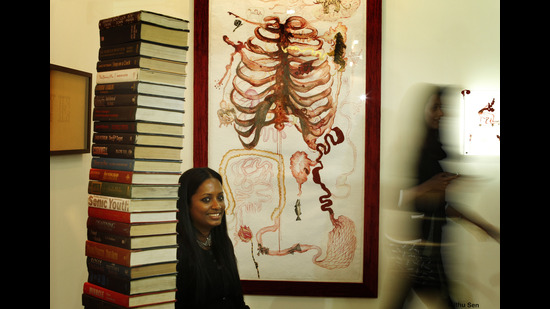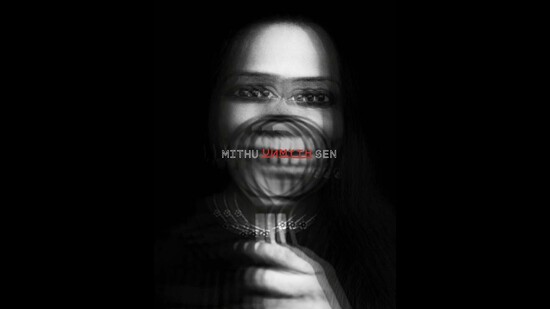Review: Mithu UnMyth Sen
A lavishly produced retrospective book presented like a live-art performance looks at Mithu Sen’s wide-ranging artistic oeuvre
Mithu UnMyth Sen is a grand and lavishly produced large-format 364-page hardback full-colour retrospective book. It simultaneously presents, deconstructs (and UNconstructs) Sen’s wide-ranging artistic oeuvre. To me, the best way to access her work is through the lens of her poetic soul and its inherent impulse. Making and UNmaking poems in its widest definition is at the core of her art — whether it is drawing, moving images, sculptures, installations, sound, performances or writing.

This book is a judiciously edited (by Irina Aristarkhova) and inventively designed (by Anusha Yadav) compendium. Apart from the original art — these two important curatorial aspects, alongside a fictional interview by Sen herself, with contributing essays by various hands, form the meat of the book. The way the book is presented is a live-art performance. You can approach it linearly, vertically, horizontally or even upside-down (a subtle and clever hint to the latter is the way the right-hand top-right page-numbers are presented — flipped on its axis). Even the word “myth” in the title has an echo of her name ‘Mithu’ embedded in it.

It is an act of ‘un’righting, ‘un’wronging, ‘unmyth’ing, untangling what is held as a norm in the mainstream. There is nothing mainstream in Mithu’s art — it is all oblique, angular, unresolved — always in a state of flux and fluidity. Whether it is about politics and language, erotica and sexuality, art and art-making, commercialism and privacy, conceptual or real — her works are a conscious act of commentary without the obvious act of pre-planning. Spontaneity, humanity and love are at its core when she births and rebirths art.
She “explores and subverts hierarchical codes and rules, with particular reference to the “myths” of sexuality, language, market and marginalisation. She constantly (un)defines concepts and its functioning with regard to acceptable modes of interactions, questioning pre-codified hierarchies that define the social performance of roles and the politics of tabooed identity.”
“Her practice produces language that come under scrutiny as linguistic structures and hegemonies are abstracted as “non-language” — a praxis that employs glitch, noise, and sonic effects in its spontaneous creation that subverts social norms, including those around art production, exhibition and reception.” This is interesting — as in her defiance, there is also compliance — in her acts of dissent, there is also acceptance. This yin-yang contradiction is a conscious one for her, one that draws its tensile strength from such oppositional forces of gravity.
Many decades ago, Mithu Sen’s Bangla poetry was translated into English for a Dutch-based organization, Poetry International. Her work represented both formal-lyrical style such as Doel, Sparrow, and her fragmentary outwardly non-poetry style that appears in her diary-like Bahia. Later, the same poems were published in an anthology, Interior Decoration: Poems by Women from 10 Indian Languages (Woman’s Unlimited, 2008); and in Aria (UK: Mulfran, 2009 / A K Ramanujan Translation Prize). Here are three short poems from her Bangla original in my English translations:
You lie down — in your lone, bleak room.
I too, lie — speechless, feverish.
Let our distance now — be immortal.
*
On your hand — I place my hand — barely.
In our hands — nothing.
*
Moment, I step on two boats —
Both my feet turned stones.
*

It is her poem like Bahia that gives us a peek into her UNrested soul, even though poems like Doel are more palatable as they are easier to read or consume. I say ‘consume’ very consciously — as we as poets do consume poetry both for the purposes of hunger and desire, and for its emotional and intellectual values. But at the core of all this is the spontaneous passion, and ‘un’ willingness to be tied down, yet always willing to be attached to the umbilical cord — “mOTHER I SPELL YOU WRONG”. And that cord is matri bhasha (mother tongue), it is the giver of nutrition and passion (blood itself). And yet she acknowledges her fountainhead in her articulation, “Poetry is my mother tongue; my mother is a poet.” Perhaps, this is her heartbeat, the core of her UNbinary, UNmyth, UNresolve’s creative mystery: “I kiss your mouth — / you translate my tongue.” (from Bahia, trans., SS)
Sudeep Sen’s paperback edition of Anthropocene (UK: Pippa Rann) recently won the Wise Owl Literary Award for ‘the best book of the year’. [www.sudeepsen.org]
All Access.
One Subscription.
Get 360° coverage—from daily headlines
to 100 year archives.



HT App & Website







